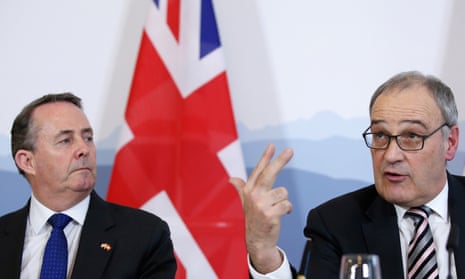A trade deal, any trade deal: that is all Liam Fox wants from his civil servants. It is not much for an international trade secretary to ask. Especially when the prospect of all-encompassing agreements on imports and exports was held up in the referendum and its aftermath as one of the chief benefits of quitting the European Union. Not least by Fox himself.
Wanting a trade deal and securing one are not the same thing, as Fox has found out in the last two years of chasing down the 69 nations that have deals with the EU which the UK needs to replicate.
As reported last week, the UK has signed up seven countries, covering £16bn of annual trade in goods when it needs to deliver £117bn worth of deals just to stand still.
Then there are the big fish that currently trade with the EU, both under WTO rules and looser ad hoc arrangements – such as the US – and ultimately there is the EU itself, the UK’s largest trading partner when taken as a bloc.
Fox explains that one problem for his department is the attitude of foreign governments to human rights. He says a group of unnamed countries would prefer not to sign a deal that includes basic rights.
Is this an excuse for a failed project – one always destined to fall foul of complex horse-trading? How can we tell? But what is clear is the battle Britain faces trying to forge new trading relationships.
It is another element of the Brexit fallacy – which of course is also the Lexit fallacy – that Britain on its own can secure more beneficial arrangements with foreign governments than the EU has.
If you are Emily Thornberry, it is the fantasy of an independent and “ethical foreign policy” which ignores the simple fact that most countries care little for her project. Robin Cook’s attempt at creating an ethical foreign policy, announced with a fanfare in 1997, lasted about 18 months, though it was almost three years before Labour admitted that doing deals with unpalatable governments was a necessity.
Thornberry has recommitted to Cook’s doctrine with a radical overhaul of Foreign Office priorities. It’s as if Labour has learned nothing in the past 20 years.
Outside the EU, striking trade deals with unsavoury governments will be a fact of life, just as it is for the EU. Except that the EU has the clout to insist on human rights being part of any agreement, just as it insists on high environmental standards and a commitment to the Paris climate accords. It also demands governments continue to set their own regulations without being dissuaded by any multinationals that claim the changes would harm their profits.
This last element of any trade deal is covered by the investor-state dispute settlement (ISDS) system, which acts as a form of arbitration but in the recent past has provided a platform for tobacco companies to sue developing-world nations that ban, tax or restrict access to cigarettes.
Last week the EU signed a deal with Singapore. In it, the Asian city-state committed itself to a reduction in C02 emissions, a focus on human rights and a watered-down ISDS. Within hours of the European parliament giving the Singapore deal the thumbs-up, Brussels sought the permission of members to start trade talks with the US.
EU negotiators don’t think these talks will succeed while Donald Trump is in the White House. For one thing, the EU proposal is limited to industrial products, whereas the US always insists on discussing a full menu of trade, including agriculture. And when agriculture is included, chlorine-washed chickens and hormone-injected beef are on the agenda, along with GM cereals grown with the help of glyphosate pesticide. The US also insists on the ISDS system in full.
This was the case under the US/EU Transatlantic Trade and Investment Partnership talks, which were developed under the Obama administration and scrapped by Trump in one of his first acts on taking office as too weak.
Then there are the tech firms – Google, Facebook and Apple – that the US is seeking to protect in its battle with China over tariffs. Would the UK back away from restrictions on their activities if it jeopardised a trade deal? The EU would refuse to water down its rules. That has been clear for some time.
And yet, Jacob Rees-Mogg, Andrea Leadsom and Boris Johnson have made it clear they must secure a release clause from the EU customs union precisely to achieve the holy grail of free trade deals with the US, Singapore, Brazil and the rest.
If the UK is prepared to submit to US demands, a trade deal is there for the taking. But the price would be joining another economic union: this time as America’s 51st state.
